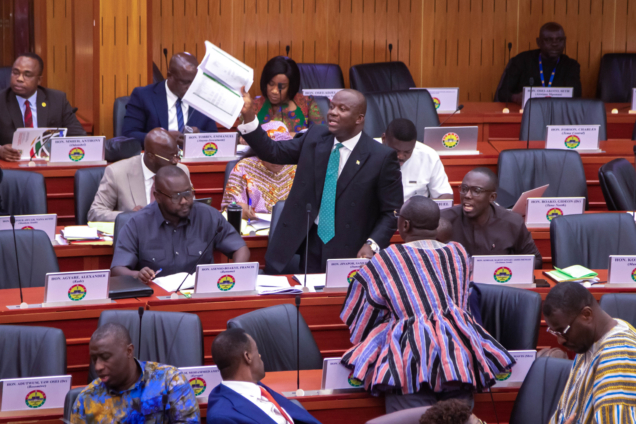Damongo Member of Parliament (MP) Samuel Abu Jinapor has sharply criticised the government for allocating GH¢13.1 billion for four helicopters and two presidential jets, questioning why such spending is prioritised while many public sector workers allegedly remain unpaid.
Speaking during the debate on the 2026 Budget, Mr. Jinapor argued that the Mahama-led administration has strayed from its core promises of easing living costs and creating jobs, choosing instead to pursue acquisitions that, in his view, fail to address the urgent needs of ordinary Ghanaians.
He said the decision was difficult to justify, noting that “nurses, teachers and other public workers are struggling to receive their salaries,” yet the government is prioritising aircraft.
“Is this the priority of the government when traders are suffering, farmers are suffering, nurses are suffering, teachers are suffering?” he asked.
Mr. Jinapor warned that such spending sends the wrong message at a time when households are feeling economic pressure and key sectors lack resources. He also dismissed claims that the government’s 24-hour economy initiative has been fully implemented, noting that even existing staff are not being paid consistently.
“When are they going to employ the two additional people to do the work that one person is doing without being paid?” he questioned.
Although the budget highlights improved inflation figures and tighter expenditure control, he said these gains are not translating into real relief for citizens. He added that government spending in the first nine months was 15% below target, a level of underspending he believes is slowing business activity, limiting access to credit, and causing widespread payment delays.
“What the Budget labels as discipline is, in fact, squeezing the real economy. Businesses are struggling to survive, consumers have cut back on spending, the youth are desperate for jobs,” he said.
He also pointed to reports of more than one million metric tonnes of paddy rice rotting in storage due to lack of buyers, describing it as a clear sign of weak demand and distress in the productive sector.
Mr. Jinapor criticised what he described as government expansion, citing the creation of new envoy roles and the appointment of 18 deputy heads of mission — more than under any previous administration. With the Bank of Ghana warning that rising compensation costs pose a serious fiscal risk, he questioned why the wage bill continues to grow while current workers are not being paid. He highlighted the increase in compensation for the Office of the President from GH¢326 million in 2024 to GH¢540 million in 2025.
He concluded that while the budget may show “good numbers on paper,” it does little to address the immediate pressures facing citizens. The former Minister for Lands and Natural Resources urged the Finance Minister and the Bank of Ghana to inject liquidity into the economy, support productive sectors, and rebuild confidence — areas he said, rather than expensive aircraft, should be the government’s real priorities.
ALSO READ:



